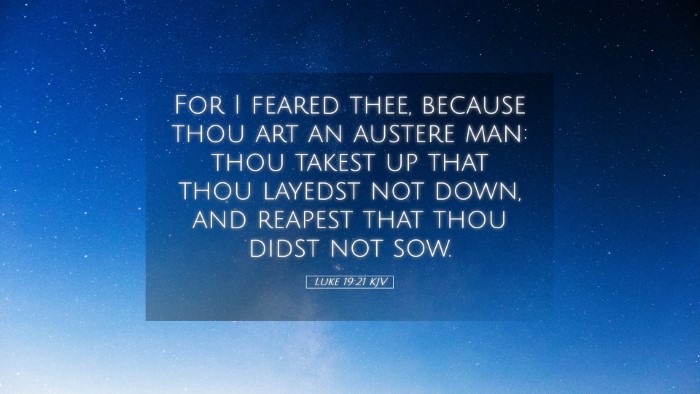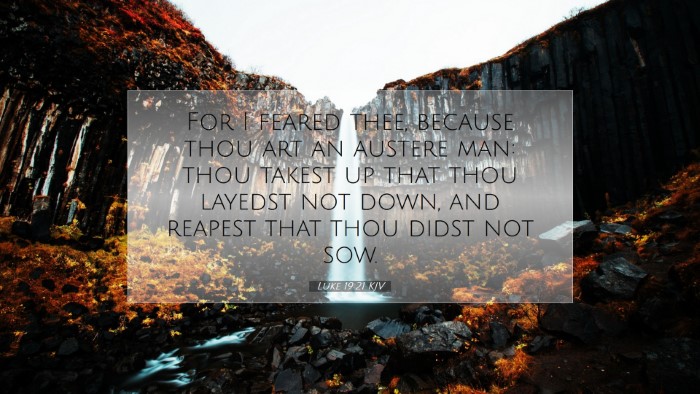Commentary on Luke 19:21
Verse: "For I feared thee, because thou art an austere man: thou takest up that thou layest not down, and reapest that thou didst not sow."
This verse forms part of the Parable of the Ten Pounds, where Jesus teaches about responsibility and the use of gifts entrusted to His followers. The character speaking in this verse is the servant who failed to invest the resources that his master had given him.
Insights from Public Domain Commentaries
Matthew Henry’s Commentary
Henry highlights the principles of stewardship found in this parable. He observes that the servant's fear of the master points to a misunderstanding of his character. While the master is indeed a stern figure, this servant views him almost entirely through the lens of fear rather than respect or love. This reflects a broader theme about how Christians perceive God—some see Him as harsh and unyielding.
- Misplaced Fear: The servant's reluctance to engage with his master's resources stems from his misunderstanding of the master’s nature. True reverence leads to proactive faithfulness rather than paralysis by fear.
- Accountability: Henry emphasizes that everyone will be held accountable for what God has entrusted to them. Failure to act is inherently a failure to honor God’s investment.
Albert Barnes’ Notes on the Bible
Barnes explores the broader implications of the character and judgment of the master. He elaborates that the term “austere” indicates a strict and just nature, but it is tempered with the inevitability of judgment for unfaithfulness. This servant, illustrating the attitude of many, fails to recognize that with severity comes also the expectation of fruitfulness.
- Understanding God's Justice: Barnes posits that God's austere approach serves justice rather than cruelty. His nature demands faithful service, which this servant neglected.
- The Misinterpretation of God’s Demands: The servant mistakes the master’s stringent standards for oppressive demands, ultimately resulting in his condemnation.
Adam Clarke’s Commentary
Clarke provides a detailed linguistic analysis of the verse, particularly the words “austere” and “reapest.” He describes 'austere' as severe and reflects on how such characteristics might provoke fear rather than love. Clarke encourages readers to assess how fear can impact one's relationship with God and influence the capacity to act on His behalf.
- Fear vs. Love: Clarke notes that an authentic relationship with God will produce love that motivates action rather than fear that paralyzes it.
- Productivity as a Measure of Faith: He stresses that productivity in one’s spiritual life is a measure of one’s understanding of God’s nature. The fear-driven servant failed to produce fruit because he did not engage the gifts and opportunities presented to him.
Theological Implications
The implications of Luke 19:21 extend far beyond the individual; they challenge entire congregations to examine their stewardship of God’s gifts. The failure to utilize what one has been given can lead to tragic consequences, as evidenced by the servant who did nothing.
Responsibility of Believers
The overarching theme in this parable is that of responsibility. Each believer is called to actively engage with their faith through the talents, time, and treasures God has given.
- Active Participation: This passage encourages believers to step out in faith and trust God’s provision, rather than succumb to fear.
- Recognizing God’s Character: Understanding God as loving yet just reframes how we view our responsibilities. An authentic recognition of His nature propels the faithful believer to active service.
Challenges to Fearful Servants
For those who relate to the fearful servant, the invitation is to confront fears and misunderstandings about God, transforming them into a fuller comprehension of His grace and expectations.
- Redefining Fear: Transform the fear of God into a respectful awe that encourages action instead of retreat.
- Empowerment through Faith: Believers are encouraged to trust in God’s goodness, which leads to fruitful service and aligned purpose.
Conclusion
Luke 19:21 serves as a poignant reminder of the dynamics between fear, understanding, and productivity in the life of a believer. Through the reflections of Matthew Henry, Albert Barnes, and Adam Clarke, one gathers a richer understanding that emphasizes the importance of viewing God correctly as a loving master who holds us accountable while also providing us the means to succeed.
This passage ultimately invites believers to examine how they respond to the gifts and callings God has placed upon their lives and challenges them to engage actively in His work with confidence and commitment.


